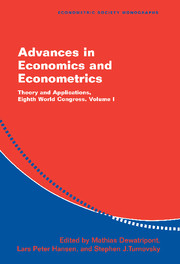Book contents
- Frontmatter
- Contents
- List of Contributors
- Preface
- 1 Auctions and Efficiency
- 2 Why Every Economist Should Learn Some Auction Theory
- 3 Global Games: Theory and Applications
- 4 Testing Contract Theory: A Survey of Some Recent Work
- 5 The Economics of Multidimensional Screening
- A Discussion of the Papers by Pierre-Andre Chiappori and Bernard Salanié and by Jean Charles Rochet and Lars A. Stole
- 6 Theories of Fairness and Reciprocity: Evidence and Economic Applications
- 7 Hyberbolic Discounting and Consumption
- A Discussion of the Papers by Ernest Fehr and Klaus M. Schmidt and by Christopher Harris and David Laibson
- 8 Agglomeration and Market Interaction
- 9 Nonmarket Interactions
- Index
9 - Nonmarket Interactions
Published online by Cambridge University Press: 19 January 2010
- Frontmatter
- Contents
- List of Contributors
- Preface
- 1 Auctions and Efficiency
- 2 Why Every Economist Should Learn Some Auction Theory
- 3 Global Games: Theory and Applications
- 4 Testing Contract Theory: A Survey of Some Recent Work
- 5 The Economics of Multidimensional Screening
- A Discussion of the Papers by Pierre-Andre Chiappori and Bernard Salanié and by Jean Charles Rochet and Lars A. Stole
- 6 Theories of Fairness and Reciprocity: Evidence and Economic Applications
- 7 Hyberbolic Discounting and Consumption
- A Discussion of the Papers by Ernest Fehr and Klaus M. Schmidt and by Christopher Harris and David Laibson
- 8 Agglomeration and Market Interaction
- 9 Nonmarket Interactions
- Index
Summary
INTRODUCTION
Why are there stock market crashes? Why is France overwhelmingly Christian and Thailand overwhelmingly Buddhist? Why did the Great Depression occur? Why do crime rates vary so much over time and space? Why did the adoption of hybrid corn follow an s-shaped curve? Why is there racial segregation? Why do mass cultural phenomena like the Hula Hoop and Harry Potter occur?
This bizarre juxtaposition of questions is bound together by one common element. Over the past 30 years, economists have suggested that models of social interactions provide the answer to every one of these questions. In most cases, the relevant social interactions are nonmarket interactions, or interactions between individuals that are not regulated by the price mechanism.
Many models of nonmarket interactions exhibit strategic complementarities, which occur when the marginal utility to one person of undertaking an action is increasing with the average amount of the action taken by his peers. Consequently, a change in fundamentals has a direct effect on behavior and an indirect effect of the same sign. Each person's actions change not only because of the direct change in fundamentals, but also because of the change in the behavior of their neighbors. The result of all these indirect effects is the social multiplier. When this social multiplier is large, we expect to see the large variation of aggregate endogenous variables relative to the variability of fundamentals that seem to characterize stock market crashes, religious differences, the Great Depression, wildly different crime rates, and the Hula Hoop.
- Type
- Chapter
- Information
- Advances in Economics and EconometricsTheory and Applications, Eighth World Congress, pp. 339 - 370Publisher: Cambridge University PressPrint publication year: 2003
- 51
- Cited by

